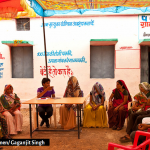
How Jayan transformed Manickal Grama Panchayat
1 July 2016
Jayan, the current vice-President of Manickal Panchayat, is an unusual individual. In Kerala’s politically charged society, he has remained politically independent, though he does get outside support from a political party. This is Jayan’s second term in the Panchayat elected body; he was the president of the previous elected body, and he played a major role in pushing for and obtaining the ISO certification for Manickal Panchayat.
Jayan’s political moves on gaining ISO comprised of quite a bit of tightrope walking, as he wooed combative political interests, to assent to the process. He made the whole thing a non-threatening effort – which is a hard act to follow, because suspicion is woven into the warp and weft of Kerala’s democratic practice. However, it was his animated and serious nature, that convinced those that did not agree with his political neutrality to pursue the ISO certification.
But then, Jayan came up against some interesting opposition to most of his innovative moves in the Panchayat.
Auditors.
Mention auditors to Jayan, and he becomes even more animated than usual. He felt that Auditors of local governments come with plenty of paternalistic baggage; often tending to stray away from the core of their enquiry – whether expenditure was incurred in a procedurally correct fashion – to apply value judgments to substantive decisions of the Panchayats. Jayan recalled how on several occasions, the Panchayat dug in its heels and refused to accept auditor’s adverse comments on its actions.
Manickal Panchayat has produced several swimmers of national and international standing and even has a public swimming pool, a rare sight in a village Panchayat. The Panchayat contributed to the preparation of its champion swimmers by providing extra milk and eggs to them. On another occasion, since there were no Drawing, Physical Education and Music teachers appointed by the government in local schools, the Panchayat made its own appointments to fill up these vacancies. Yet again, responding to demands from educated youth, the Panchayat set up a coaching centre for preparing students to appear for competitive examinations for government employment. In all three cases, the Auditor felt that the expenditure was inappropriate, and exceeded the scope of responsibilities of the Panchayat.
Jayan did not relent. He got the Panchayat to pass a resolution disagreeing with the Auditor’s views. Meeting the objections head on, he wrote to the government justifying the Panchayat’s actions. He used his political links – remember, he was friends with everybody in every party – he persuaded the government to accept his explanation. The audit query and the recommendation to disallow the expenditure, was rejected.
What kind of effort does it take, to run a panchayat as good as Manickal? I spoke to Devaki, a second time member of the Panchayat, to get some sense of what she does throughout the day.
Like many others who are immersed in local political activity, Devaki wears many hats. She is an active member of her political party. She climbed the political ladder by first playing a mediating role in local disputes, settling cases, often going back and forth between working with families and groups, as also helping the police in investigations. From there, Devaki graduated to becoming a formal member of the District level legal services authority; she used her political connects to get the position. Devaki has a beat that takes her through her constituency, which she follows scrupulously. She only gets Rs. 3500/- as a monthly honorarium; this amount is grossly inadequate to cover her costs. Therefore, to save money, she increasingly contacts her constituents through phone. Her phone number is given to all shops in her ward so that people can contact her. Furthermore, she has fixed collection points – shops and the office of the women’s collective where she is a member – where citizens can contact her and leave their documents for her to collect and submit to the Panchayat office.
As I left the Panchayat, with my new found friends, Jayan and Devaki waving their goodbyes, I reflected on one aspect completely missing in our conversations.
Nobody mentioned bureaucrats, or the district administration, as being connected with the efforts of the Panchayat.
District Administrators, who think that the entire country will collapse if they are not present to watch over boisterous locals, please note. Nobody really cares at the ground level for what you do, or what you don’t do,
Media persons, please note, people really make things work. But because any of you don’t go down to the ground to see what is happening, you tend to believe that good bureaucrats alone are catalysts for anything good that emerges through local development. Please remember that very often, the district administration is only a messenger, a spokesperson who is not averse to taking the credit for what other, ordinary people do.





